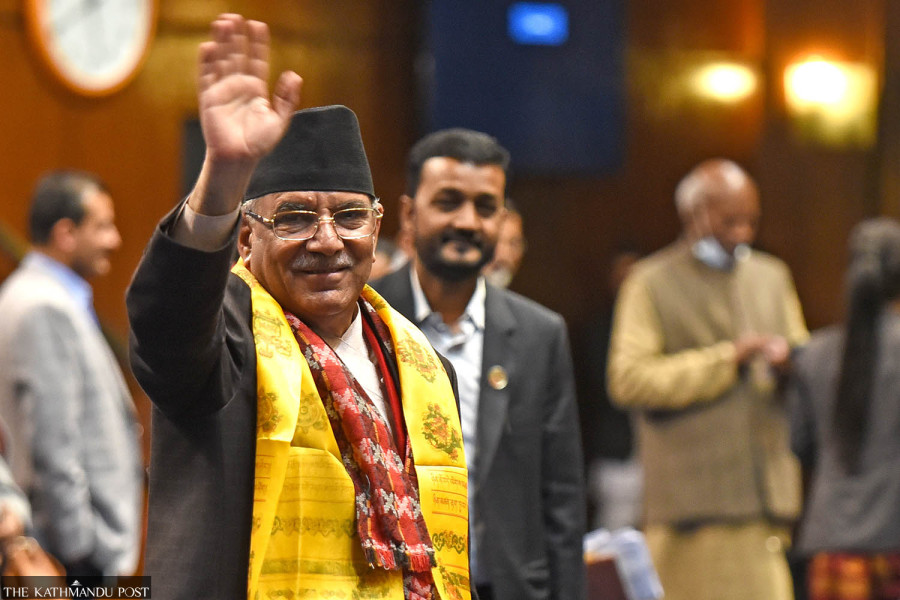Politics
Coalition split on revising common programme
Prime Minister Pushpa Kamal Dahal secures a vote of confidence for the second time in 70 days.
Tika R Pradhan
On Monday, Prime Minister Pushpa Kamal Dahal got a vote of confidence for the second time in 70 days, this time with a different set of coalition partners.
With the change in the major constituents of the coalition–the Nepali Congress, the largest party in parliament, replacing the second largest CPN-UML–the government is all set to move ahead in a new direction.
“Today, the prime minister got the vote of confidence. We are yet to discuss other issues related to the government and its policies,” said Purna Bahadur Khadka, vice-president of the Nepali Congress and lawmaker, who is also a major contender to lead the party in the government. “Everything will start anew.”
With the UML and the Rastriya Prajatantra Party (RPP) voting against the motion and the only lawmaker of the Nepal Worker and Peasants Party (NWPP) opting not to vote, Prime Minister Dahal received 172 votes of the 262 lawmakers present in the House of Representatives.
Though some leaders including UML vice-chair Bishnu Poudel and RPP chair Rajendra Lingden suspected Dahal could be seeking a new confidence vote every two months, other leaders like CPN (Unified Socialist) chair Madhav Nepal and the prime minister himself assured lawmakers that the new coalition would last for next five years. According to leaders of major parties in the new coalition, Dahal will lead the government for the first two years.
But Dahal also told Parliament about UML chair KP Sharma Oli’s prediction that the new government would not last more than two months.
During his previous vote of confidence, only two lawmakers—one from the NWPP and the other from the Rastriya Janamorcha—had stood against the motion.
The second trust vote done and dusted, the new ruling coalition could now face a dilemma about what to do with the Common Minimum Programme (CMP) unveiled on January 9—a day before Dahal had secured his vote of confidence for the first time.
The UML-dominated ruling coalition unveiled the 21-point CMP on January 9 incorporating the commitments made by coalition partners in the elections and the UML dictated the agenda as the panel to finalise the document was led by UML vice-chair Bishnu Poudel.
Led by the then Finance Minister Poudel, the panel included Barshaman Pun from the CPN (Maoist Centre), Mukul Dhakal from the Rastriya Swatantra Party (RSP), Dhawal Shumsher Rana from the Rastriya Prajatantra Party (RPP) and Rakam Chemjong from the Janata Samajbadi Party (JSP) as members.
Congress leaders and lawmakers have said the CMP prepared by the UML-led coalition will be revised once the party joins the government.
Addressing the House on Monday, Congress chief Sher Bahadur Deuba said his party will join the Dahal-led government after giving it a vote of confidence.
“Of the old Common Minimum Programme, only theoretical issues like the commitment to strengthen democracy, which matches our party’s objectives, could remain intact,” said Bishwa Prakash Sharma, one of the two Congress general secretaries. “We cannot accept the CMP in its existing form though that could be a document of compromise among the new coalition partners.”
He said that with three major constituents of the CMP—the UML, the RPP and the RSP—now out of the government, their programmes cannot be given continuity.
Before the vote, Prime Minister Dahal said in Parliament that the Common Minimum Programme devised by the previous UML-included seven-party coalition would be given continuity.
While responding to the queries of the parties before the trust vote on Monday, the prime minister expressed his commitment to the CMP.
“I’m still committed to whatever commitments I had made before getting the previous confidence vote,” Dahal said in parliament. “We will push them with new vigour as soon as the government gets a full shape.”
Dol Prasad Aryal, lawmaker and vice-chair of the Rastriya Swatantra Party, one of the major constituents of the Dahal’s government, said there wouldn’t be any change in the programme prepared by the previous ruling coalition as it incorporated many of his party’s commitments made during the November 20 polls last year.
“We decided to give our confidence vote to Prime Minister Dahal after he committed to give continuity to the issues we raised and incorporated in the CMP,” Aryal told the Post.
Aryal also informed the Parliament that the programme was a special initiative of his party.
Leaders of the CPN (Unified Socialist) have also said the CMP must be revised incorporating the concerns of the Congress and their party as they were not part of the previous coalition. "With the change in the composition of the alliance, the CMP must be revised including our issues," said Rajendra Pandey, vice chair of the Unified Socialist, who is also a lawmaker.
Prime Minister Dahal accused the two coalition partners–the UML and the RPP—of violating their commitments, which, he said, led to the fall of the previous coalition.
“There were some ideological and political disputes among the coalition partners but we had prepared a Common Minimum Programme based on consensus and agreed not to raise the past disputes,” Dahal said in Parliament. “I remained committed to the cause but a few other parties were not.”
The Dahal-led government will get a full shape in a few days and discussions for the same will start among the 10-party coalition from Tuesday. Revision of the CMP will also be discussed.
After getting the trust vote on Monday, Prime Minister Dahal told reporters that he would give full shape to the Cabinet in a few days and related discussions would start on Tuesday morning.
“We will give the government complete shape within 2-4 days and start working right away. The government can easily function with the votes I got. Now development works will get momentum.” Dahal told reporters after the trust vote.




 8.22°C Kathmandu
8.22°C Kathmandu















